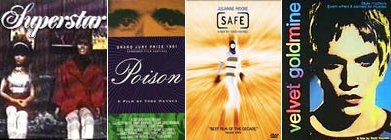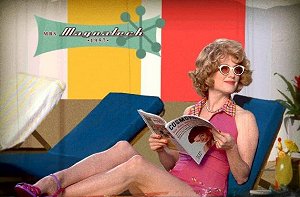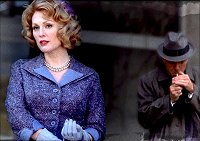

Rich: Safe has a lot of Kubrick-style imagery in it. Then in Velvet Goldmine thereís Citizen Kane all the way through itóI really enjoyed that. And then Far From Heaven is an homage to the films of the í50s. Obviously youíre doing that consciously, but are you making a statement about film history by making films in that kind of a style?
Todd: Thereís always reasons why Iím drawing from certain traditions. Theyíre not necessarily things you have to know about to appreciate the films. I like it best perhaps when you donít have to know too much about those things to have them work for you. Itís almost like the great Simpsons episodes that are so referential but kids love it. I mean you know what itís like to watch Rocky & Bullwinkle growing up and miss all the jokes, but you know somethingís there and it draws you in deeper. These are the things that draw me deeper into whatever it isófilm, art, literature. So yeah, Far From Heaven is the best example of that because itís this crazy hybrid movie that appeals to both intellectual sensibilities and everyoneís mom! And that is just crazy to me. Itís also something you canít anticipate. You canít really plan it that way. You just have to trust your own instincts.
Rich: Even the way the characters react to these issues is exactly as if they wouldíve been living in a film in the 50s. How did you come up with that idea?
Todd: Well itís just not that different from other things I was doing. We were just having a more limited and specific point of reference. And ultimately itís trusting in those sources, trusting in the progressiveness and the surprising radicality of modes that we very easily turn our nose up at and move on from. And maybe just a good healthy mistrust of what we consider new and cool today, an insistence that thereís more at stake. Thereís investment in characters and ideas that weíve lost in a very immediate-gratification-driven culture. I love those films. I find them really poignant partly because they reject that idea of the hero. Theyíre about really simple people who are much more like all of us than they look.

Rich: And they actually grapple with moral questions instead of just have this simple black and white approach.
Todd: Yeah exactly, they grapple with moral questions and usually they buckle under the pressures of their world. And so you see them failing and yet you canít blame them for it; you have to look beyond the individual characters for the cause of whatís wrong. And I think that brings us all together. The heroic story in a way leaves us in the lurch because weíre not really like that. It just belittles our own experiences in a way.
Rich: Safe was set in the late-80s, Velvet Goldmine in the í60s-í70s, Far From Heaven in the í50s, your next film will probably be in the í40s if youíre continuing going back through time. But theyíre dealing with really contemporary issues. All of them touch on issues of sexuality and Aids and that kind of thing even though they take place back in time. And other filmmakers are dealing with them in completely different ways. Is that a conscious thing?
Todd: I do love delving into different historical moments and sort of getting into the clothes of the past basically. And then the style and languageóthe forms that come from those times which in a way tell their stories better than their content does. And I also think giving the audience even the slightest interpretive job wakes them up, puts them back in the movie in a way that movies I think increasingly forget to do for people. They just start to do it all for you, tell you everything you need to know ten-fold if theyíre not just blowing things up and giving you a kind of good amusement park ride instead. So giving an audience back their own instincts, their own potential to think or feel or make connections, is important. And you canít overwhelm the audience either. In Far From Heaven itís just enough of a distance from today to make you really think back about today very easily.

Rich: What about Julianne Moore? Did you write the role for her in Far From Heaven?
Todd: Yeah. Yeah.
Rich: Could you ever imagine anyone else in it? What if she couldnít have done it?
Todd: [speechless] Itís not even ... itís not even ... you know, itís not even ... Iíve nothing to say about it.
Rich: Itís her role.
Todd: Itís her role.

